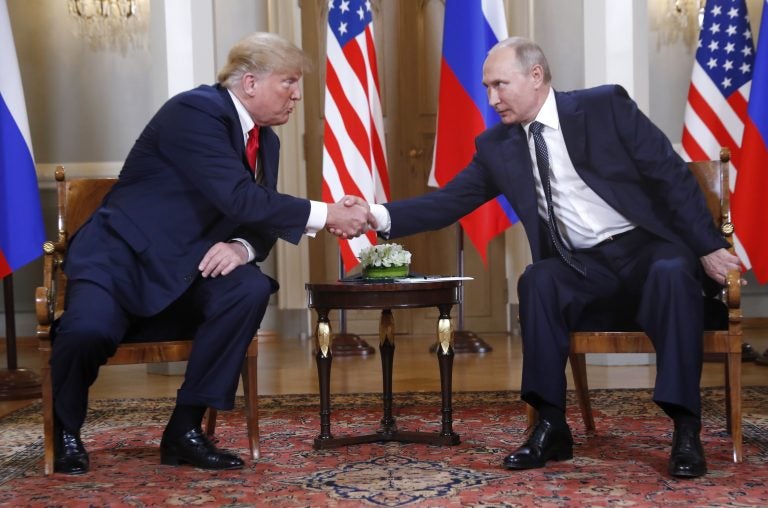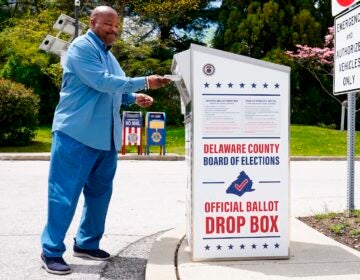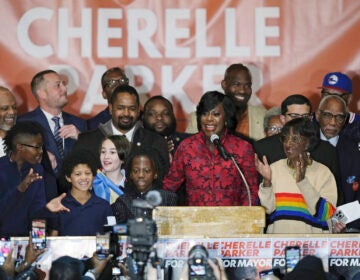Federal lawmakers call for warning Russians to stay out of U.S. elections
Pending measures in the House and Senate aim to keep foreign governments from tampering in U.S. midterms
Listen 4:07
U.S. President Donald Trump, left, and Russian President Vladimir Putin shake hand at the beginning of a meeting at the Presidential Palace in Helsinki, Finland, Monday, July 16, 2018. (AP Photo/Pablo Martinez Monsivais)
When President Donald Trump took the side of Russian President Vladimir Putin over that of U.S. intelligence officials after they met in Helsinki recently, many GOP lawmakers took the rare step to criticize him.
Central New Jersey Republican U.S. Rep. Leonard Lance even pushed a resolution commending and supporting the intelligence agencies – an unusual move.
“I think it’s important for the Congress in a bipartisan capacity to defend the intelligence agencies. I have great faith in [Director of National Intelligence Dan] Coats and in the other officials leading those agencies,” Lance said.
And U.S. Rep. Tom MacArthur, a South Jersey Republican, also rebuked the president, saying his words sent a bad message.
“I disagreed with them. I think he tried to make amends when he came back and clarified, but his words were unfortunate,” he said. “Look, I’ve never hesitated to oppose the president when I think it’s appropriate, and I did on the Helsinki comments.”
Now, a bipartisan group of lawmakers from the Philadelphia region is calling for Congress to send a strong signal to the Russians, warning them to steer clear of November’s elections.
But it’s unclear if those calls will translate into action.
MacArthur is behind a pair of bills on the subject. One measure would force the administration to alert Congress of any meddling from abroad in the election. Another seeks to get foreign companies out of the businesses of supplying American states and localities with election equipment such as voting software.
“That gets to this whole issue of how we allow foreign companies to invest in the United States,” MacArthur said.
He says the U.S. must send a forceful message across the globe.
“We cannot have foreign, belligerent governments tampering with our elections. And Russia, by all accounts, has tampered and attempted to have an impact on our elections. We have to stop that,” he said.
In the Senate, a slew of legislation is also picking up broad support.
One bill — sponsored by Florida Republican Marco Rubio and Maryland Democrat Chris Van Hollen — says Russian interference in any election would automatically trigger very deep sanctions. Pennsylvania Republican Sen. Pat Toomey, a Pennsylvania Republican, likes the intention of the bill.
“I want them to know that if they were to meddle with our elections again, they will have to pay a very, very high price,” he said. “In the hope that that knowledge will dissuade them from it.”
But some lawmakers fear that bill could have the unintended consequence of hurting U.S. companies that unwittingly are tied to Russian firms in an increasingly interconnected global economy. Toomey, who said he’s reviewing that sanctions bill, said he’s torn on it because he doesn’t want Congress to act merely to act.
“I’m open to it, but I want to make sure that we think it through carefully,” he said.
Previously, though, GOP senators defeated a proposal to send funds to states to help gird against foreign interference this year. The states haven’t spent all of the $380 million Congress has already sent them to fight intrusion ahead of November, Republican lawmakers argued.
Sen. Chris Coons, a Delaware Democrat, said the First State needs more help from Washington.
“Even in my little state of Delaware, that’s just a down payment on improving our cybersecurity,” he said.
Coons is also pushing the Secure Elections Act, which would help streamline American elections. And he says Coats’ recent assessment should leave no one guessing about what Russia plans to do this fall.
“That would solve some issues around security clearances and access to information for election officials. But frankly, we could not have gotten a clearer warning than we got from Coats … saying, I think, memorably, that all the warning lights are blinking red, and Russia continues to be a threat to our upcoming elections,” Coons said.
There is not a vote scheduled for any bills related to election security or Russian sanctions. Supporters vow to pressure GOP leaders until they bring legislation to the floor to address some — if not all — the deficiencies in the U.S. electoral system.
WHYY is your source for fact-based, in-depth journalism and information. As a nonprofit organization, we rely on financial support from readers like you. Please give today.




